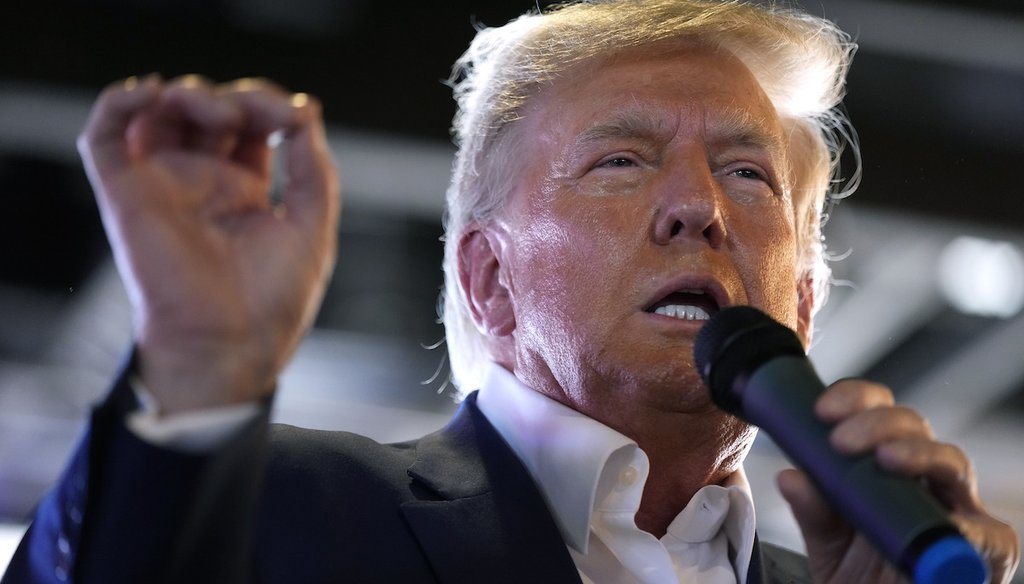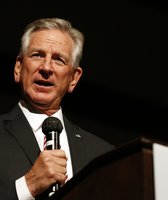Stand up for the facts!
Our only agenda is to publish the truth so you can be an informed participant in democracy.
We need your help.
I would like to contribute

Former President Donald Trump speaks to supporters during a visit to the Iowa State Fair on Aug. 12, 2023, in Des Moines. (AP)
If Your Time is short
-
Trump-aligned pundits said the Fulton County indictment seeks to criminalize mundane actions such as asking for a phone number or encouraging the public to watch a meeting. The indictment says these actions were taken to further a criminal conspiracy.
-
There are many actions that on their own that are not illegal. But added together, these actions can be part of overt acts toward a conspiracy.
-
One former federal prosecutor suggested the pundits’ selective representation of everyday acts is akin to “taking a frame of a movie, not looking at the full movie.”
President Donald Trump’s allies are reframing Trump’s Georgia indictment as the work of overzealous prosecutors who are pursuing defendants for mundane — and legal — activities.
"Things that are apparently illegal in America," wrote Libs of TikTok, a conservative social media account with 2.4 million followers on the platform X.
"1. Tweeting that you’re watching TV
"2. Reserving rooms for meetings
"3. Asking someone for a phone number."
Sign up for PolitiFact texts
We found several other examples of Trump’s allies plucking a couple of sentences from the indictment and isolating them as everyday activities deemed criminal. Todd Starnes, a conservative columnist and radio show host, claimed tweeting was a criminal offense. In a since-deleted post, Greg Price, a conservative social media commentator, claimed "getting people to attend legislative hearings" is now illegal.
In isolation, none of those things would be illegal. But prosecutors aren’t saying these actions on their own are criminal. Rather, the prosecution, using the state’s Racketeer Influenced and Corrupt Organization, or RICO, statute, will try to convince jurors that the defendants pursued these humdrum acts in service of a broad conspiracy to violate the law.
"There are lots of innocuous, everyday actions that are perfectly lawful, if not constitutionally protected, when taken on their own, but that can be evidence of overt acts in furtherance of a conspiracy," Steve Vladeck, University of Texas law professor, told PolitiFact.
John Felipe Acevedo, an Emory University law professor, pointed to the example of a bank robbery. It is not a criminal act to search for a bank address on Google or tune up your car. But investigators view those actions in different legal light if they find they were part of a plan to rob a bank and use the car for a getaway.
"Intentions matter," Acevedo said, "and since people rarely announce that they are about to commit a criminal act, context matters."
The indictment alleges that Trump and his associates "were attending meetings, making phone calls, and urging the public to ‘stop the steal’" of the 2020 election, said Joan Meyer, partner at the law firm Thompson Hine LLP and a former federal prosecutor. "But along with that, they are charged with making false statements to state officials and scheming to create a slate of false electors. What the indictment shows is a multi-person criminal conspiracy."
Although legal experts said reasonable people can disagree about whether every action in the indictment should be included, the indictment is not intended to criminalize ordinary activities.
"These comments reflect a complete misunderstanding of how RICO works," said Bradley Moss, a partner with the law firm Mark S. Zaid, P.C., in Washington, D.C. "The government has to demonstrate the existence of a wide-ranging, overall criminal scheme encompassing different criminal violations by different defendants that were themselves furthered by several overt acts."
This "is not unusual in a RICO case at all," Moss said.
Intentions and context matter
The 98-page indictment lists 161 acts it alleges "were committed in furtherance of" the "conspiracy to unlawfully change the outcome of the election in favor of Trump."
Chronologically, they begin Nov. 4, 2020, when Trump falsely declared victory in a speech.
The Libs of TikTok post argued that the indictment paints tweeting, reserving meeting rooms and requesting phone numbers as crimes. Libs of TikTok cited Acts 22, 57 and 6 from the indictment. The indictment said these acts furthered the conspiracy.
-
Act 22: Trump tweeted, "Georgia hearings now on @OANN," on Dec. 3, 2020, referring to the pro-Trump cable network One America News Network. Trump appeared to be referring to election-related hearings held by the Georgia state Senate, which featured Rudy Giuliani, Trump’s lawyer, making false and misleading claims about election fraud. (Giuliani was also indicted in the Georgia case.)
-
Act 57: One of Trump’s co-conspirators reserved a meeting room at the Georgia State Capitol that would later be where 16 "fake" electors gathered to vote for Trump.
-
Act 6: Mark Meadows, Trump’s then-chief of staff, texted Rep. Scott Perry, R-Pa., and asked for the phone number of the speaker and leader of Pennsylvania’s state legislature because "POTUS wants to chat with them." Trump allies in Pennsylvania, a state Biden won, planned to send "fake" electors to vote for Trump.
Libs of TikTok was one of many Trump-aligned figures to make similar claims.
-
"Making fun of Mike Pence is illegal now too," conservative activist Jack Posobiec wrote on X.
In reality, no one was charged for "making fun" of Vice President Mike Pence. Posobiec is citing Act 140 in the indictment, which shows Trump’s pressure campaign on Pence to reject the legitimate election results.
According to the indictment, Trump called Pence on Jan. 6, 2021, to ask Pence to disrupt and delay the joint session of Congress on the day that it was required to count electoral votes. When Pence refused, Trump said Pence "would ‘go down as a wimp.’"
-
Charlie Kirk, founder and president of the conservative group Turning Point USA, claimed that "telling the public to call lawmakers" was "a criminal conspiratorial act."
Kirk cited Act 38 in the indictment, which showed that Giuliani tweeted Dec, 7, 2020, to urge people to "call your Senate & House Reps & ask them to sign the petition for a special session." Trump allies sought a special session to pick electors who would cast votes for Trump.
Vladeck said the examples in the indictment don’t make the argument Trump’s allies are suggesting.
"The point is not that these magically become crimes unto themselves," Vladeck said. "It’s that, when those actions are part of an organized plan to commit some other crime, they become evidence of, and an element of, that underlying crime."
Stan Twardy, a corporate litigator and former U.S. attorney in Connecticut who was appointed by President Ronald Reagan, suggested the pundits’ selective representation of everyday acts is akin to "taking a frame of a movie, not looking at the full movie. You have to look at the whole context of what is being said – it’s a whole discussion as opposed to one sentence or one phrase."
A RICO indictment, he said, "gives the whole movie."
RELATED: Fact-check: 8 Pants on Fire statements by Donald Trump about Georgia 2020 election
RELATED: 3 key differences between Donald Trump’s Georgia indictment and his other 3
RELATED: Read the indictment of Donald Trump in Georgia 2020 election case
Our Sources
CNN, Former President Donald Trump’s fourth indictment, annotated, Aug. 15, 2023
Email interview with Bradley Moss, partner with the law firm Mark S. Zaid, P.C., Aug. 15, 2023
Email interview with Joan Meyer, partner at the law firm Thompson Hine LLP and a former federal prosecutor, Aug. 15, 2023
Email interview with Neama Rahmani, former federal prosecutor who is now president of West Coast Trial Lawyers, Aug. 15, 2023
Email interview with Steve Vladeck, University of Texas law professor, Aug. 15, 2023
Telephone interview with Stanley A. Twardy, Jr. Of Counsel at Day Pitney and former U.S. Attorney for the District of Connecticut and Chief of Staff to Gov. Lowell P. Weicker, Jr. Aug. 15, 2023
Telephone and email interview, John Felipe Acevedo, visiting associate professor of practice, Director LLM/MCL programs at Emory Law, Aug. 16, 2023
The Federalist, How Stupid Is The Georgia Anti-Trump Case? They Indicted Trump For Tweeting At People To Watch TV, Aug. 15, 2023
Todd Starnes post on X, Aug. 14, 2023
ABC News, Special prosecutor will examine actions of Georgia's lieutenant governor in Trump election meddling, Aug. 15, 2023
The New York Times, Two Months in Georgia: How Trump Tried to Overturn the Vote, Aug. 14, 2023
PolitiFact, Trump falsely and prematurely claims 2020 presidential victory, Nov. 4, 2020
CBS News, Timeline: The Trump investigation in Fulton County, Georgia, Aug. 15, 2023
NBC News, Trump and 18 co-defendants charged with racketeering in Georgia 2020 election probe, Aug. 14, 2023
The Associated Press, A look at the 19 people charged in the Georgia indictment connected to Trump election scheme, Aug. 15, 2023
Yahoo News, Indictment lays out Mark Meadows's alleged role in conspiracy to overturn 2020 election, Aug. 15, 2023
PolitiFact, What you need to know about the fake Trump electors, Jan. 28, 2022
FOX 5 Atlanta, Journalist who discovered GA alternate elector scheme called to testify, Aug. 1, 2023




























